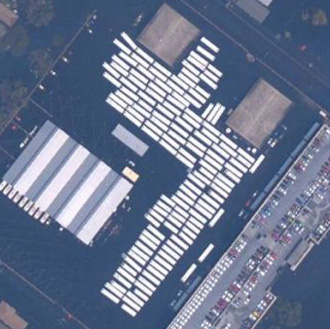Petroleum News:Interview with Matthew SimmonsTo cope with the coming oil shock and much higher oil prices, Simmons told Financial Sense Newshour, the world, led by the United States, will have to become drastically energy efficient virtually overnight. A series of changes, including transporting all goods that currently travel by truck, by rail or water, could cut oil consumption 20-40 percent, he said.
“So by getting trucks off our highway system we have a major impact on removing traffic congestion. And traffic congestion is public enemy number 1 through 5 on passenger car fuel efficiency. So it’s a real win, win, win,” he observed.
Of course 98% of all Americans would rather
Others rode mass transit (Satire)But Seriously, the congestion benefits of intermodalism are overblown. A "normal" truckload shipment goes directly from shipper to consignee (most often, at least one is in a suburb of a major metro area). An intermodal shipment has to go from the shipper to a railyard and be loaded then at the other end be picked up from another railyard and taken to the consignee. So you have a truck at both ends going into a city (where congestion and its impacts are far worse) and of course if the rail hubs aren't in the same cities as the origin and destination the truck will be on surface streets in
four cities.
The Ontario truck association
writes: (PDF)Expansion of intermodal operations for moving freight is another popular concept, almost a panacea for relieving congestion. Certainly intermodal shipping can have benefits for relieving overall congestion on the highway system. However, intermodal shipping will do little or nothing to relieve urban congestion as the freight must still begin and end its movement on a truck. It helps the provincial system but the impact of truck traffic on local roads is not reduced by intermodal shipping. Most intermodal facilities are located far outside urban areas. The freight is brought to the facility by rail but then trucks still have to take the freight to its final destination.
In fact, the recently completed Ontario Surface Freight Transportation study from Transport Canada, found that in the GTA [Greater Toronto Area], even if the railways were able to achieve their hoped for market share of intermodal traffic, the impact on highway capacity would be “pretty small.” The study concludes that “in the busiest stretches of Highway 401, (the passenger-car equivalent of shifting
trucks off the road) is less than 0.5% of the traffic volume.”
Also
80% of American communities only get freight by truck. I sure hope the other 20% don't mind all the freight moving through their towns.
Not to mention rail is more expensive for the most common freight moves. Intermodal Freight works best as large point to point unit trains for trips over 500 miles and the minimum size and length of haul requirements are going up, not down
Ontario Truck Association: Truck/Rail Cooperation Trains Magazine:Europe’s hub-and-spoke intermodal services stumbles. . The Average length of haul for trucking was 485 miles in 2002 according to the
Bureau of Transportation Statistics. The FMCSA has a breakdown by commodity type available in another
report..
And there is the small matter of how to convince shippers to use rail.
A 1990 study, commissioned by Transport Canada, from the Institute of Guided Ground Transport at Queen's University found that:
Based on average rail length of haul of 700 km [434 mi], the current level of highway user charges for trucks would virtually need to more than triple before any significant modal shift to the railways would occur for most commodities; and, Virtually all short-haul (under 500 km [310 mi]) freight traffic would stay with truck, regardless of the level of user charges. The study suggests that 70 per cent of truck traffic is short-haul. (In fact, about 90 per cent of all truck traffic moves less that 600 km [372 mi], and probably 95 per cent less than 700 km.)
Raising truck taxes is not a solution to the railway sector's problems.
-Ontario Truck Association: Truck/Rail Cooperation (link above).
One more detail, the rails are loaded heavily the same places trucks are. It would take several years of national effort to expand their capacity sufficiently to take a significant portion of truck freight. Short Sea shipping has promise as well as shipping more goods by sea from Asia to the East coast of the US.

Truck Traffic Flows (Volume)

Rail Traffic Flows (Tons)

Waterborne Freight Traffic Flows (Tons)





